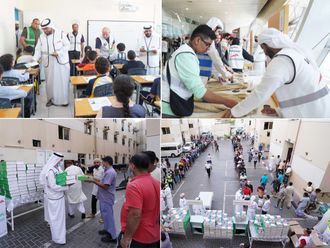It is fashionable in India to talk of how Indian democracy has failed us. Ironically, such conversations are usually conducted by those who have benefited the most in modern India.
Go to any of the page three celebrity bashes in Delhi, and it is not unusual to find the capital's movers and shakers pouring scorn on the political class in particular.
At a caviar lunch on a winter weekend, the abuse of netas (leaders) seems to flow with the food intake. Finally, the host whose opulent farmhouse was built on the bricks of defence deal kickbacks, grandly pronounces: "Look, at this bloody country of ours where nothing seems to work. I'd rather be in some banana republic under a dictator than live under a stifling democracy run by incompetent and corrupt politicians!"
It's the kind of dismissive remark that we have now come to accept in this country. There is a section of the Indian citizenry which is simply seceding from this country, and finding the fastest route to Manhattan, or better still New Zealand. And it's not just the corporate world which is taking refuge in its gymkhanas, or better still, in green cards.
Almost every bureaucrat's child today studies in a foreign university or else has a job with a foreign bank in America. No one it seems wants to have a permanent stake in Indian democracy.
Which is why the NRI brotherhood appears to be increasing by the day. Nor is it just the grocer shop on a Southall stereotype that defines the Indian immigrant. The global Indian citizen is today a man of the world, someone with the intellect and the accomplishments that can match the best in the world.
At the recent Pravasi Diwas celebrations in the national capital, it was heartening to see the number of people of Indian origin who had made a dramatic impact in the global world. From prime ministers to bankers to net pioneers, Indians have successfully explored political and financial avenues across the world. In a sense, they have been brand ambassadors, selling the "made in India" label to different parts of the world.
With the grant of dual citizenship, there is the hope that this large Indian diaspora will now be able to work even more effectively. After all, the non-resident Chinese have played an important role in the shaping of the Chinese economy. Why can't the NRI and people of Indian origin play a similar role in this country? Why can't they become the engines of progress and dynamism?
The answers, unfortunately, aren't quite so simple. Cut through the hype surrounding the Pravasi Diwas, and the reality remains that of a disconnected, disjointed Indian diaspora. No doubt there is a cultural and emotional bond that cuts through geographical boundaries.
Just witness an Indian diamond merchant's son's wedding in Antwerp, or the hysteria evoked by Bollywood stars in Dubai and Durban, or the warmth of a Sikh taxi driver in Vancouver, and it is apparent that there is a special relationship that holds together this vast Indian parivar.
But long-term partnerships are not built on emotions alone, or simply on the popularity of film stars. What it needs is a meeting of ideas and identity, a conviction that India is not just a place where one is born, but whose value systems and whose future one shares and one is committed to.
This is, unfortunately, where both the Indian leadership and the diaspora have failed to reach an understanding that can eventually lead to a full-blown relationship.
Unfortunately, at the moment, there still remains too much mistrust on both sides. The Indian leadership has never fully come to terms with the remarkable success achieved by the NRIs and people of Indian origin. Even today, the diaspora is only valued in dollar terms and little else.
Which is perhaps one reason why the Indian government was seen not to have done enough to support the cause of Fijian Indians, or why there hasn't been greater pride in the achievements of our doctors and scientists in the United States, and why a Kalpana Chawla has still not been given a real heroine's reception in this country.
Which is also why the Gulf returnee, who has helped build a flourishing remittance economy in states like Kerala, has never quite been accorded his due. Which also explains why it has taken so long for the government to actually go ahead with the dual citizenship scheme.
On the other hand, the NRI community too remains cynical about India and Indian democracy. At the Pravasi Diwas seminars, it was not unusual to come across participants who were almost contemptuous of the Indian system.
At one level, one would have to sympathise with them. Yes, our politicians are increasingly incompetent. Yes, they are terrifyingly corrupt. Yes, it's difficult to work in a system which rarely rewards merit.
But surely a Naipaulian-like cynicism is hardly the way forward. It's easy enough to focus on the flaws in our society. The crisis of caste and communal divide is serious, but groups of NRIs have hardly helped improve the situation by the manner in which they have openly endorsed the agenda of the Vishwa Hindu Parishad, often mistaking manufactured political agendas for a genuine religious identity.
Naipaul himself, who is today critical of the BJP government on the Tehelka issue, was once an apologist for the Babri Masjid demolition. Similarly, corruption remains endemic to our system, but how many NRIs have actually offered solutions that would promote greater transparency?
Moreover, what of the numerous achievements made by post-independent India? What of the fact that we are a country which is self-sufficient in foodgrains, that we produce world-class satellites, that we have enhanced rural inter-connectivity and that we have been able to considerably reduce levels of absolute poverty? And what of the IITs that have provided the intellectual capital which is today being used across the world?
The glass of Indian democracy may be half-empty, but it is also half-full.
The point that needs to be emphasised is that we need to look beyond stereotypes and ideological baggage. Both the government and the diaspora need to look beyond attitudes that are shaped either by condescension or derision. Only then is there hope for a mutually beneficial relationship.
The writer is Political Editor, New Delhi Television.
Analysis: Glass of Indian democracy half-empty, half-full
Analysis: Glass of Indian democracy half-empty, half-full












